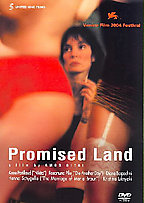
PROMISED LAND
Israel, 2004, 98 minutes, Colour.
Rosamund Pike, Diana BespechnI, Hannah Schygulla, Anne Parillaud.
Directed by Amos Gitai.
Israeli director, Amos Gitai, has made a number of documentaries over the years. While he has a doctorate in architecture, he has chosen to focus in more recent years on film-making and has moved from documentaries to features and fiction.
He has shown life in contemporary Israel (Aldila), he has gone back to 1948 and shown the origins of the state of Israel as well as the plight of the Palestinians (Kedma). This time he has strong social criticism of Israel as well as the Palestinians and the various groups, like the Russian Mafia, who are manipulating refugees, especially in the exploitation of the white slave trade.
The film opens in the Sinai Desert, the Bedouin conducting a group of women refugees to Israel (and reminding the audiences that with all the races and empires that have come and gone, they are still there). What is alarming in the desert is a sudden auction, taking place in the dark, where the exploiters arrive, brutally examine the women and bid for them. French actress Anne Parillaud is frightening as the woman conducting the auction. It is one of those shocking sequences that will remain in the mind and memory, that women can do this kind of thing to one another. In the background are the Russian criminals who are going to supply Israeli brothels with these women.
In a transition to the resort town of Eilat, the women are further humiliated, stripped naked and hosed like cattle. They are then dressed, made up – with another significant cameo by German actress Hanna Schygulla. At this time there are some moments of tenderness, especially for some of the women who are frightened and regret their choices.
The film then takes a journey to Haifa where several of the women are placed for work in the hotel Promised Land (with its deceptive biblical overtones and the title for the film). Here the interest of the film is in an English woman as well as a woman from Estonia – with evocative memories of a choir singing in an Estonian Orthodox church, the psalms of blessings on Israel. The young woman is played by Diana Bespechni and the English woman by Rosamund Pike (Die Another Day, Pride and Prejudice). It is only by an act of terrorism, a bomb exploding near the hotel, that the two women are able to escape.
The film is made with much hand-held camera work, often in the dark, resembling the techniques of so many of the contemporary reality television programs. It is a draining experience, often ugly – but an alert to this kind of evil in the contemporary world.
1.The Israeli perspective of the director? His background in feature films, documentaries? Loyalty to Israel, critique of Israel? Critique of the Palestinians?
2.The documentary film-making background, this film as a virtual documentary? The use of the techniques of reality television shows? The intimate detail, the close-up, immersing the audience in the reality? The musical score?
3.The title, its irony, the refugees from eastern Europe travelling through the Sinai Desert into Israel? The hotel and its being called Promised Land? The irony that this was no promised land for these women?
4.The reality of the white slave trade, refugees from eastern Europe, their being exploited for money, Russian and Israeli gangs? Smuggling the women into the country? Setting them up in the hotels? The power over them?
5.The treatment of the women, the having to give money, in the trucks, going through Egypt and the desert after the plane ride to Egypt? Hidden away in the trucks, being guided by the Bedouin? The humiliation of the harassment and assaults by the men? Their arriving at the border? The horror of the auction, the vivid reality, the woman conducting the auction, the men, the money bids, the humiliating examination of the women? Their being taken to different parts of Israel? To Eilat and the Red Sea resorts? The long travel to Haifa? The women being stripped, hosed like cattle, seductive dress, presence in the club, the attitudes of the men, the treatment? The life of prostitutes?
6.The men, the Russians and their brutality, the Israelis and their being in league with the Russians? The Bedouin and the Palestinians and their comments about having seen so many empires come and go but their still being there? All complicit in the trade?
7.The woman conducting the auction, strong, vicious, greedy? Treating the women inhumanely?
8.The contrast with Anne, her German background, marrying a Jew, coming to life in Israel? Her becoming a madam? Her treatment of the women, kindly words, making them up, not wanting the fearful prostitute to cry? A moment of peace and comfort?
9.Diana, her coming from Estonia, her fears? Her talking to Rose? Imploring Rose’s help? Eventually Rose listening, having compassion, Rose’s own memories?
10.The character of Rose, her presence at the auction, part of the prostitution ring or not? Her seeming an observer? Yet her presence with the women? The memories of Estonia, the religious ceremonies, the choir, the singing of a psalm by Christians – with the Old Testament and Jewish overtones? The blessings on Israel and Jerusalem? The ironies for the women?
11.The sharing of stories? The glimpses of the other women and suggestions of their stories?
12.The hotel Promised Land, the attempts to escape? The irony of the terrorist bomb? Its effect, the brigades, the police, Rose and her seeking out Diana – and their eventual escape? Finding another land of plenty, another promised land?
13.The film contributing to an understanding of the difficulties of refugees, migrations, gangs, white slave trade, human exploitation?